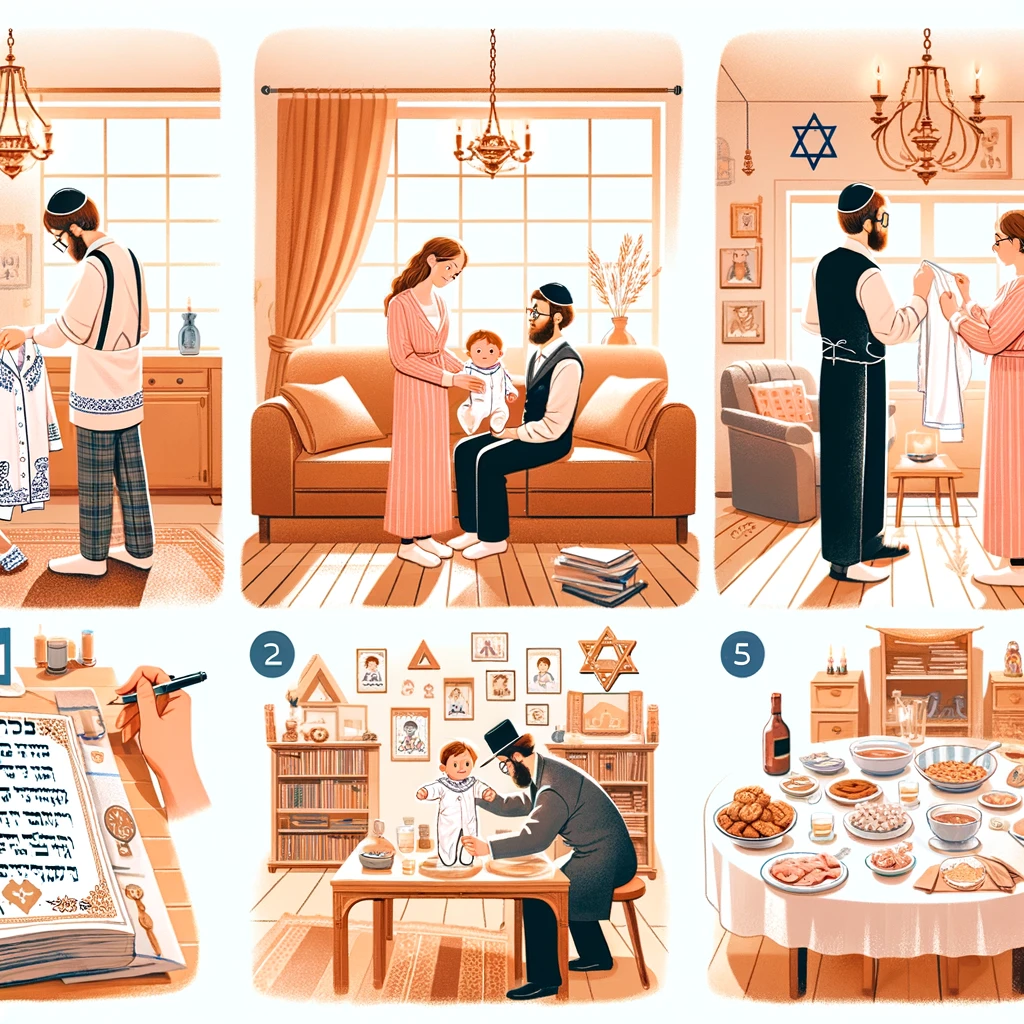The Role of the Mohel in Modern Jewish Culture
Qualified sap

 1221
1221 
The Mohel in the Modern Era: Between Tradition and Modernity
The brit milah, one of the oldest and most significant rituals in Judaism, has stood at the heart of the Jewish people's identity for thousands of years. At its center is the mohel, the guardian of the tradition and the expert in both spiritual and practical aspects. But in an era of rapid changes and technological advancement, how does the mohel cope with the challenge of integrating the eternal with the innovative? This article will examine the processes of adaptation and innovation in the mohel's work and his efforts to maintain the relevance and significance of the brit within a changing society.
Mohel as a Bridge Between Worlds - The Old and the New. The contemporary mohel is required to stand with one foot in the world of tradition and the other in the world of science and advancement. On one hand, he must carefully preserve the laws and customs that have been passed down from generation to generation surrounding the brit milah. On the other hand, he must be attentive to the changing needs of society and integrate contemporary methods and approaches. This complex balance requires mohels to be open, creative, and flexible in their thinking and actions.
"The mohel is like a bridge," says Rabbi Chaim Levi, a veteran mohel and lecturer at the Institute for Brit Milah Studies. "We take the eternal principles of the brit and translate them into contemporary reality. This means adopting technologies and scientific knowledge without compromising on essence and meaning."
Mohel as a Professional - Training and Specialization. One of the prominent expressions of the mohel's evolving role is the growing emphasis on professional training and medical specialization. While in the past, most training depended on apprenticeship and learning from veteran mohels, today there are formal and structured certification programs. Mohels are required to study anatomy, physiology, current surgical techniques, and of course the in-depth laws of milah. Rigorous certification exams ensure a high level of knowledge and skill.
"Our training combines the best of both worlds," explains Rabbi Moshe Cohen, a graduate of the certification program and an active mohel. "We acquire a solid medical foundation alongside complete mastery of the halakhic tradition. This enables us to provide the best and safest service to families."
Mohel as an Advisor and Supporter - Supporting the Family Before and After the Brit. Alongside the medical professionalism, the mohel's role today also includes a dimension of guidance, counseling, and emotional support for families. Many mohels offer preparatory meetings where they explain the process of the brit, answer questions, and alleviate concerns. This personal and empathetic approach continues even after the ceremony itself, with guidance for caring for the baby and full availability for any consultations.
"The brit is not just a medical procedure, but a defining experience for the entire family," says Rabbi Sarah Datan, a parent counselor and author of books on the subject. "The optimal mohel understands this significance and invests in a personal connection with the parents. He places his hand on their hearts during both the exciting and challenging moments."
Mohel as an Ambassador - Meeting Diverse Audiences. The dynamic social reality presents mohels with new and diverse audiences. Alongside traditional families, mohels today meet with same-sex couples wishing to hold a brit, interfaith families, or those preferring an intimate ceremony at home. The ability to accommodate, explain, and bridge cultural gaps is becoming increasingly essential. The mohel acts as a type of ambassador, connecting worlds and allowing every Jew to feel a part of the shared tradition.
"I meet incredible people from amazing backgrounds every day," shares Rabbi Yossi Shapira, a young mohel from the liberal sector. "Some are more connected, some less, but all want to give their child a meaningful entry into the Jewish people. I feel my role is to embrace everyone, to show the beauty of the tradition, and to make it accessible in a language that speaks to them."
Mohel as an Innovator of Tradition - Developing Contemporary Rituals and Customs. Many mohels are also leading innovations and refreshment of the brit ceremony itself while preserving the core halakhic essence of the brit. For example, incorporating different languages in prayers and blessings, creating unique texts tailored to the family, or adding communal elements like singing and dancing. These trends express a desire to make the brit more relevant and meaningful for the younger generation of parents without compromising its sacred nature.
"The mohel is essentially a continuer of tradition," says Dr. Rivka Goldberg, a researcher of Israeli customs. "But continuity does not have to be an exact copying of the past. It can also include creativity, adaptation, and a response to the spirit of the time. As long as the essence is preserved, there is room to renew and refresh the language and form."
Mohel as a Dreamer for the Future - Ensuring the Continuity of the Brit. Perhaps the most important role of the mohel today is to pass the torch of the brit to the coming generations. Through mentoring young mohels, providing inspiration, and setting a personal example, and making knowledge accessible to the general public - today's mohels ensure the future of the brit. They plant the seeds that will grow the tradition keepers of tomorrow, ensuring that the brit continues to resonate and influence each generation.
"We as mohels become a sort of sandak," concludes Rabbi Levi. "We hold the baby, but also the future of Jewish tradition. This is a tremendous honor but also a heavy responsibility. At every brit, we pray that this act will continue to bear fruit, and that this small child will grow to be a link in the eternal chain of our people."
Questions and Answers:
Does a mohel working in a hospital also have to undergo specific training?
Absolutely. Mohels in hospitals are also required to successfully complete a certification program that includes the study of halakhah, medical practice, sterilization, and more. They work in coordination with the medical staff, but the halakhic authority for performing the brit is in their hands. Parents should ensure that the chosen mohel is legally qualified, regardless of where he works.
Are families allowed to make personal changes or additions to the brit ceremony?
There are possible frameworks for incorporating personal elements, as long as they do not contradict halakhah or undermine the religious focus of the ceremony. For example, one can add songs, blessings in different languages, or explanations. It’s important to consult with the mohel in advance, share desires, and ensure all additions are acceptable to him. Openness and cooperation between the family and the mohel allow for creating a personalized yet tradition-bound experience.
What is the central message that mohels try to convey in their work today?
First and foremost, mohels seek to emphasize the eternal and powerful significance of brit milah. It is the moment when the baby formally becomes a part of the Jewish people, entering into the covenant of Abraham our father and connecting with a heritage of thousands of years. Alongside this, mohels also want to strengthen the relevance of the commandment in everyday life, encourage family and community involvement, and make the brit a defining and joyful experience for all present.
In conclusion, the figure of the modern mohel embodies the complex and wonderful challenge of balancing preservation with renewal, essence with form, past with future. Through their sacred work, mohels demonstrate that Jewish tradition is alive and breathing, capable of adapting to every era without losing its uniqueness and strength. They serve as a model for all of us - to embrace our heritage with pride and joy, to make it an inseparable part of our lives, and to pass it on in all its glory to those who come after us.
The brit milah, as it is conducted by today's mohels, stands as a living testament to Judaism's power to touch every generation anew. It is a remarkable example of how universal and eternal values find living and contemporary expression, relevant to every time and community. Each time a baby enters into Abraham our father's covenant, we are granted a renewed glimpse into the wonder of continuity, renewal, and the power of our heritage. The mohels, through their sacred work, allow us to experience this wonder and be part of it - for ourselves, for our children, and for the generations to come after us.






